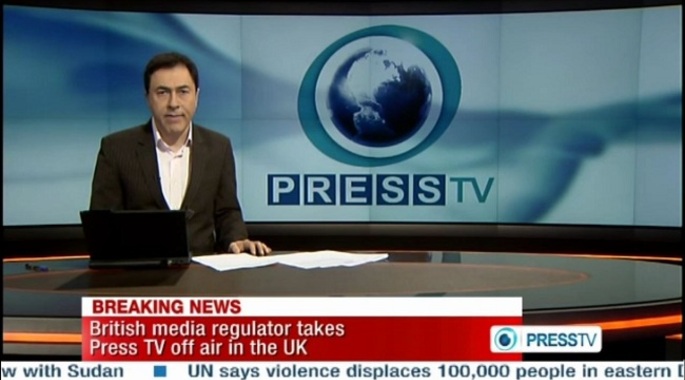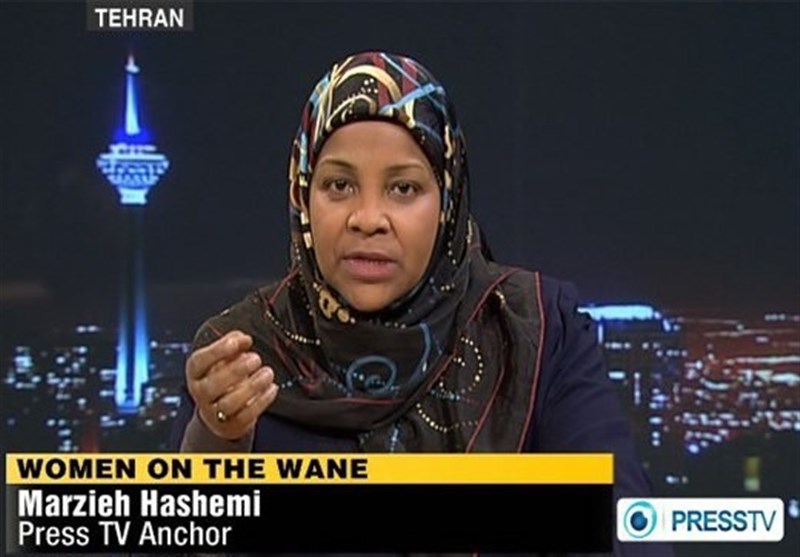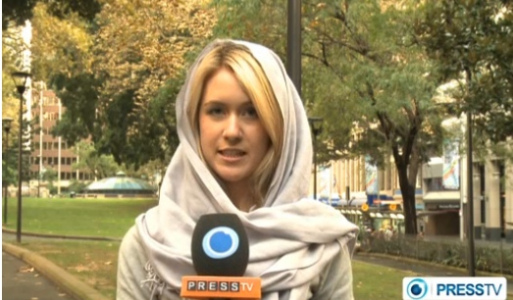Australia/Israel Review, Featured
Hard Pressed
May 29, 2019 | Ran Porat

Iran’s propaganda network in Australia
Press TV is a 24-hour English and French-language news and documentary network affiliated with the Iranian regime. Available in Australia through one satellite or via internet streaming, it operates under the umbrella of Islamic Republic of Iran Broadcasting (IRIB), the only legal TV and radio broadcaster inside Iran. It was founded in 2007 to compete with other 24-hour English-language satellite channels like the BBC, CNN and Al Jazeera International. It is wholly funded by the Iranian regime.
The following analysis is the product of hours of sifting through content produced by and about the Iranian Press TV network in English – focusing on its coverage of Australia, the people working for the network in Australia and guest commentators on the network’s stories about Australia.
Two key findings arise from this in-depth analysis of Press TV’s activities in Australia.
Firstly, the Iranian network exploits Australian democracy to vilify Australian society, culture and politics. This abuse is ongoing.
Secondly, coverage of Australian contemporary issues is one-sided, low quality and is amplified by the use of so-called ‘analysts’, who almost universally hold extreme anti-West and anti-Israel views, in line with their support for the oppressive regimes of Iran and Syria. Conspiracy theories, antisemitism and even Holocaust denial are frequent themes among Australians sought out as “analysts” by Press TV.
The bottom line is indisputable: an official channel of Iran – a country with which Australia has full diplomatic relations and with an embassy in Canberra – is consistently and systematically broadcasting anti-Australian content, hatred of Israel and rejection of Western culture, while giving a free platform to numerous dubious extremists based in Australia and around the world.
In this first article in a two-part series, I will review the role of Iranian media in general, and Press TV in particular, plays as a propaganda tool for the regime.
Iranian media as a propaganda outlet
Ali Fallahian, Iran’s former minister of intelligence, admitted in a 2017 TV interview that “Under the cover of business, or mostly journalism […] most of the journalists are agents of the intelligence ministry.”
Looking at the output of Press TV, Fallahaian’s revelation should not be a shock to anyone. The history of this network reflects how the regime in Teheran has used the guise of alleged “legitimate journalism” to create a state media outlet which is simply a propaganda vehicle serving the regime, with little or no pretext of observing journalistic norms and standards.
From its early days, it was clear that Press TV, operating from its headquarters in Teheran, was designed to be a mouthpiece for the regime. It even allegedly assists the regime in interrogating political prisoners.
In 2007, Press TV CEO Mohammad Sarafraz described the aim of the station, saying that “Since September 11 [terror attack on the US], Western bias has divided the media into two camps: those that favour their policies make up one group and the rest of the media are attached to radical Islamic groups like Al-Qaeda. We want to show that there is a different view. Iran, and the Shi’ites in particular have become a focal point of world propaganda. From the media point of view, we are trying to give a second eye to Western audiences.”
Press TV does not even attempt to act as an impartial news platform. Leading Iranian politicians and public figures associated with the regime receive ample screen time on Press TV, reciting the Mullahs’ message of the day, while dissidents or opposition supporters never get into the studio.
A 2018 report by the US-based Atlantic Council’s Digital Forensic Research Lab exposed close and high-level cooperation between the Russian state-funded media channel, RT, and Press TV. The two networks were shown to host each other’s analysts and reporters and tout the same anti-Western narratives and conspiracy theories in their respective broadcasts. They also regularly refer their social media followers to each other’s platforms as recommended news and information sources.
RT is, of course, renowned as a major source of conspiracy theories and “fake news.”

American-born anchor Marzieh Hashemi was briefly arrested in the US
Negative sentiments towards Western culture appear to be a prerequisite for getting a job at Press TV. Take, for example, anchor Marzieh Hashemi, born Melanie Franklin, who converted to Islam after marrying an Iranian. After living in Iran for some time, she was arrested in 2019 during a visit to the US as a “material witness” and then released without being charged. After her return to Teheran she admitted chanting “Death to America” at rallies yet, at the same time, refused to give up her US passport because of her allegedly “black and red” (African-American and native American) ancestry.
Another famous Press TV employee was Dawud Salahuddin, who worked as chief online editor until 2009. In 1980, Salahuddin had killed an Iranian dissident in the US as part of an organised Iranian assassination plot.
Press TV is not interested in human rights either. According to the human rights organisation “Justice for Iran”, Press TV journalists collaborated with the Iranian Revolutionary Guard Corps (IRGC) and the Iranian Ministry of Intelligence by conducting “interviews” with political prisoners, that were in fact confessions obtained by force and/or fraud, while in some cases Ministry of Intelligence interrogators were present in the room.
The channel had its licence revoked in the UK in 2012 after airing an interview/interrogation with imprisoned and tortured Newsweek and Channel 4 journalist Maziar Bahari, arrested in Iran for reporting on demonstrations against the regime. In collaboration with Iranian security service personnel, Bahari was interrogated by Press-TV about his statements opposing Holocaust denial, his film on Jews trying to escape the Holocaust, and his Jewish connections.
Mohammad Sarafraz, the head of IRIB, and Hamid Reza Emadi, senior editor at Press TV, both took part in the fake Bahari interview, and are now among 87 Iranians that appear on the European Union’s human rights sanctions list. They are banned from travelling to Europe and their assets in the EU have been frozen.
In 2013, Press TV’s parent organisation, IRIB was placed under US sanctions for violating human rights and jamming foreign channels, but action against the broadcast network has since been waived yearly. In late 2018, Washington initiated sanctions on IRIB’s director, Abdulali Ali-Asgari. And in March 2019, Facebook took down pages operated by Pars Today, an organisation working under IRIB, because they “engaged in coordinated inauthentic behaviour of Facebook and Instagram” to spread Iranian state messages using fake accounts.
Unsurprisingly, central to Press TV’s line is a vehemently anti-Israel message, which often veers into outright antisemitism. In 2014, academic Rusi Jaspal from De Montfort University examined the discourse and content of Press TV (and the Teheran Times), and concluded that “these outlets construct, disseminate and encourage delegitimising and, in most cases, demonising social representations of Israel. Consistent with the ideology of Iran, they adopt an unequivocally anti-Zionist stance and present Israel in terms of a ‘regime’, a global terrorist threat, as well as central concern to the Islamic Ummah [nation]”.
Press TV Journalists in Australia
In Australia, Press TV can be viewed off the OPTUS D2 satellite with a satellite dish, or streamed via the internet. Press TV also maintains an infrequently updated Press TV Australia Facebook page.
Until 2015, the network was employing an Australia-based reporter on a regular basis, but this seems to have ended in recent years, with coverage of Australia now usually done from Teheran.

Controversial Press TV reporter Edwina Storie
Several Press TV reporters in Australia were embroiled in scandals and controversy. In 2013 the network’s correspondent in Sydney was Edwina Storie. It turns out that Storie, who was reporting for Press TV wearing a headscarf, allegedly previously posted seductive lingerie shots online in a manner which would not sit well with the ultra-conservative regime in Teheran. Storie threatened legal action against the blog which exposed the photos claiming that she was targeted because of her “anti-Zionist report” about an anti-Israel Boycott, Divestment and Sanctions (BDS) event at Sydney University. She later dropped the suit and is now working for ABC Life.
Milly Stilinovic worked for Press TV in Sydney in 2013, covering for example Canberra’s response to Australian-Israeli Ben Zygier’s (‘Prisoner X’) suicide in an Israeli prison. Now a contributor to Forbes, her enthusiastic support of Amnesty International does not appear to be in sync with her work for a regime with one of the worst human rights records in the world today.
Most Press TV reporters in Australia have been visible political activists. Take for example Reme Sakr, who submitted several stories for Press TV in 2014 and 2015, including one about a “new wave of Islamophobia in Australia“and protests against refugee detention centres and the G-20 summit held in Brisbane. Sakr is a leading member of the Australian Hands Off Syria group, which supports the regime in Damascus. She had met dictator Bashar al-Assad in 2013, as part of the joint delegation with the WikiLeaks Party.
Rihab Charida worked for Press TV between 2009 and 2011. Born in Sydney to Palestinian and Syrian parents, she is a member of the “Gaza Defence Committee” and a BDS activist. In 2016 she directed and produced a documentary called “A Disturbed Earth”, which deals with the Safsaf massacre by Israeli soldiers of several dozen Arab villagers in the Galilee during the War of Independence (1948). In a crowdfunding page for her project Charida described her film as “a documentary about a small Galilean village invaded by European militias during the olive harvest of 1948”.
Defaming Australia
Press TV diligently works to spread Teheran’s propaganda, including portraying Australian society in a universally negative light.
Press TV reports on Australia often do not meet basic journalistic standards, and do not even attempt to hide their negative views on Australia’s government. The stories chosen almost exclusively and disproportionally focus on problems in Australian society to create the impression of a country in crisis, and of a corrupt government. The channel excessively and almost exclusively only covers protests in Australia – for example on refugee-related issues. In the large majority of cases, only the anti-government side is heard, with no attempt to balance the report or commentary with any differing opinion. This editorial policy continues today, even after Press TV stopped using local residents as reporters, but still talks from Teheran to specific Australian “analysts” using online communication.
Meanwhile, ordinary Australians are sometimes portrayed as longing for Iranian guidance to deal with these problems. A good example is the story by Fatima Wehby (December 2015) on reactions in Australia to a letter by the Supreme Leader Ayatollah Khamenei addressed to the youth in the West. After claiming that “many young people in Australia have positively received” the letter, she interviewed Hussein Dirani of the Ahlul-Bait World Assembly (“Family of the House” of Islam), an Iranian-based international Shi’ite organisation dedicated to spreading Khomeini’s theological ideas. Dirani called on the young people of the West to stop their governments from implementing “two-faced policies”. After praising Khamenei’s letter (“a beacon of light”), echoing Dirani, Wehby argued that “the youths [in Australia] were also concerned about the hypocritical policies of their Western governments.”

A typical Press TV report on Australia’s asylum seeker controversies
In 2013, Daniel Pizzaro, the Australian Press TV reporter at the time, produced a feel-good story on how his network (and unsurprisingly also RT) was becoming a popular “source for alternative news” in Australia, while also attempting to counter the accusations against Press-TV with regards to the Bahari interview, noted above.
Racist views, anti-Muslim sentiment and social problems in Australia are all Press TV favourites. For example, their 2015 four-part series “Down and Under” focussed on racism in Australia against various populations (Muslims, Africans, Indigenous people). Press TV reporter Hamid Farajollahi’s commentary on an incident of possible police brutality in Brisbane late in 2014 was to claim that “this is a trend that has been going on in Australia for many many years, and we haven’t seen response from the government”. A few months earlier, Farajollahi made a similar claim about “the government simply not helping at all” and actually making things worse while discussing a story about unemployment rates in Australia.
The 2013 Press TV documentary “The Aborigines: The End of a Dream” reviewed “the racial discrimination practiced in Australia against Aboriginal Australians whose culture and life have been endangered by White Australians.” The same year, the focus of the “Poor White Kids” story was on “the lives of Australian children growing up in Australia’s ‘welfare ghetto’.” In 2011, Press TV reporter in Australia Rihab Charida ran a story on how “Australia turns a blind eye to Aboriginal deaths in custody”, while in an earlier report(2009) she focused on a study claiming one in 10 Australians are “racial supremacists” and/or have anti-Muslim sentiments. In 2010, Press TV reporter Golnaz Bassam-Tabar chose to cover alcohol abuse problems in Australia.
Protest and rallies against the government received special attention from Press TV’s Australian reporters. Farajollahi covered protests against possible policy changes on university fees (2014) which were organised by groups aligned with the Australian Labor Party (ALP) – a fact omitted from his report, which did not also include any responses from government officials. He took the same critical approach when reporting on Canberra’s asylum seeker policies, not balancing his story with anyone supportive of the government. Anusha Menon filed several reports in 2014, including one about a protest against the Abbott Government, without introducing anyone supportive of the government to balance her story.
While all these stories may have legitimate news value, and have been reported by other outlets, Press TV’s coverage stands out because it is almost exclusively focussed on reports that cast Australian society in a poor light. In addition, these stories are reported in a manner which consistently excludes any alternative viewpoints, instead offering a platform solely to critics of the Australian Government and society without any pretence of balance.
The second part of this story, to be published next month, will focus on Press TV since 2015, when the network stopped using Australian correspondents, and on the Australian and international “analysts” Press TV elects to feature as interviewees. Here’s a spoiler – things have not improved since then, rather the opposite.
Dr. Ran Porat is researcher and lecturer at the Australian Centre for Jewish Civilisation, Monash University and a research fellow at the International Institute for Counter-Terrorism at the Interdisciplinary Centre, Herzliya, Israel. Part 2 of this story will appear next month.
Tags: Australia, Iran, Media/ Academia






